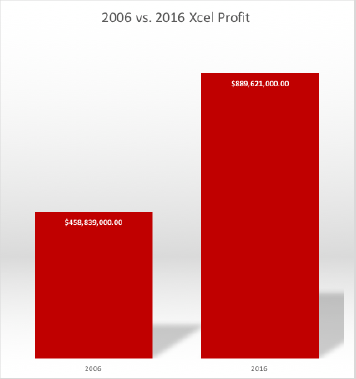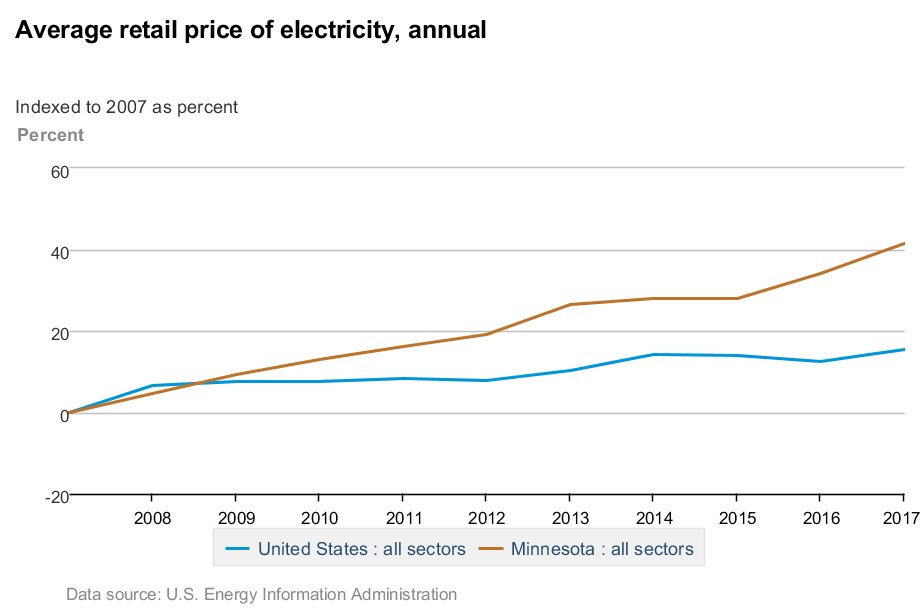Utility Dive Names Xcel Energy “Utility of the Year.” We’re Less Impressed
Utility Dive, a website that covers the ongoings of the electric utility industry, has named Xcel Energy the Utility of the Year for 2018, commending the company for retiring coal-fired power plants and investing billions in future wind, solar, and natural gas installations. As for us, we don’t think Xcel should be applauded for pursuing policies that result in higher profits for Xcel shareholders at the expense of the families and businesses who have no choice but to buy their electricity from the monopoly utility.
Along with Minnesota, Xcel Energy is the primary provider of electricity to Colorado, and they have been less than forthcoming about the costs associated with transitioning to a grid with less coal, and more wind, solar, battery storage, and natural gas. In fact, Xcel issued the following statement as part of their proposed Colorado Energy Plan (CEP).
According to Utility Dive:
“We believe the [Colorado] plan is a model for a successful clean energy transition. It will provide over $200 million worth of savings for customers compared to the alternatives, while reducing carbon emissions nearly 60% and increasing renewable energy sources to 55% of our energy mix by 2026 in the state,” Xcel said.
Paragraphs like these are littered with enormous caveats, as my friend Amy Cook and others at the Independence Institute in Colorado, have pointed out:
“Xcel forecasts that this “Steel for Fuel” plan will save money, but the plan’s savings are several decades away. Even then, the proposal never lowers the cost of electricity, it only forecasts that it will lower the rate of increase.”
“The current set of rules within the state of Colorado is driving Xcel’s “Steel for Fuel” strategy. Without it, there are very few avenues that can reliably provide the growth its shareholders and Wall Street demand. Without this plan there is the possibility that its stock price could suffer. So, the bet is on shutting down coal units and putting workers out of work and investing in “green” intermittent sources of power with the hope that unproven power storage will become a reality no matter how expensive.”
“Here, sadly, is the problem for Xcel’s Colorado ratepayers: It’s impossible for electric utilities to make massive capital investments without increasing costs, and in the regulated utility world that means rising rates for customers. Anyone who has looked at their electric bills over the last decade knows that as Xcel has built more, rates have gone up.”
Xcel is playing the same games in Minnesota as they are in Colorado: Prematurely closing highly efficient power plants like Sherburne County Units 1 and 2 many years before they would actually need to be replaced, build wind, solar, and natural gas, and watch the shareholder profits soar.

Remember, it is not possible to actually replace coal with wind or solar because sometimes these intermittent sources of electricity generate energy, but most of the time they don’t. This means either coal or natural gas must be available to keep electricity flowing to our hospitals, homes, and schools when the weather isn’t cooperating.
This means we pay (Xcel and the other monopoly utilities in the state) for all three sources of electricity, when in reality we would only need the coal or natural gas to ensure reliable electricity service. This is why Minnesota’s electricity prices have increased 26 percent faster than the national average since 2007.
Utilities should be rewarded for keeping costs down and providing reliable, and affordable electricity to the consumers who are forced to purchase their electricity from them. They shouldn’t pat themselves on the back for taking advantage of ratepayers who have no other choice but to pay higher prices for wind turbines that only last 20 years.